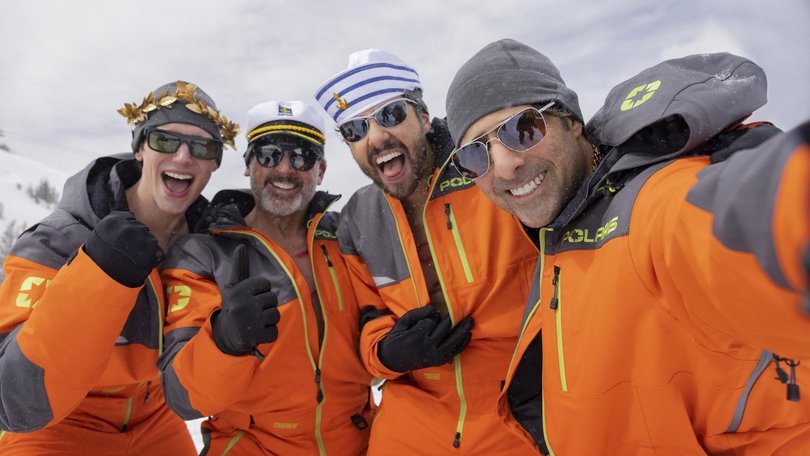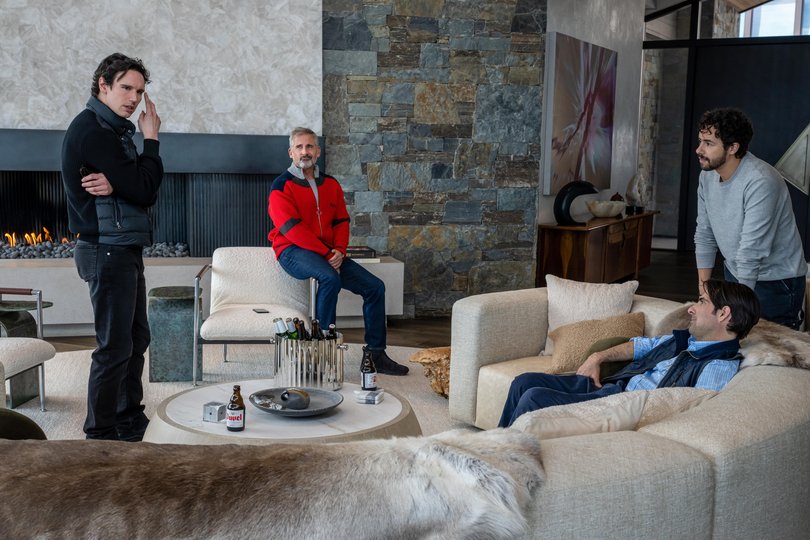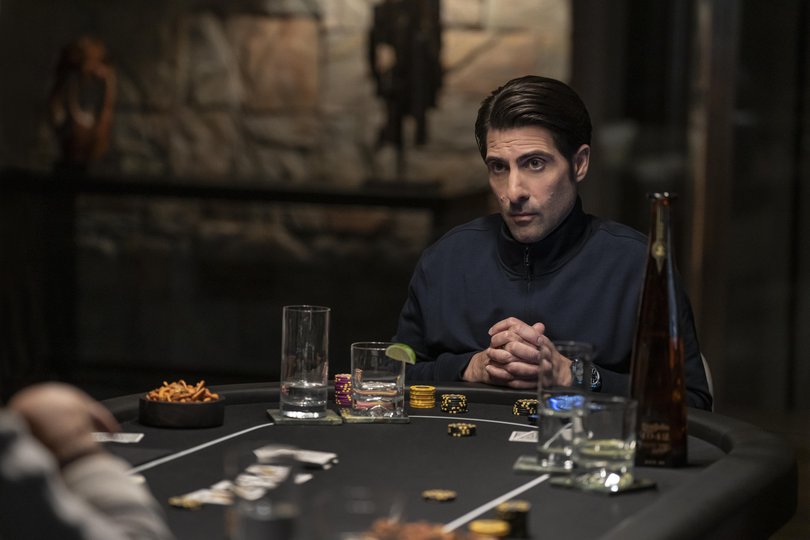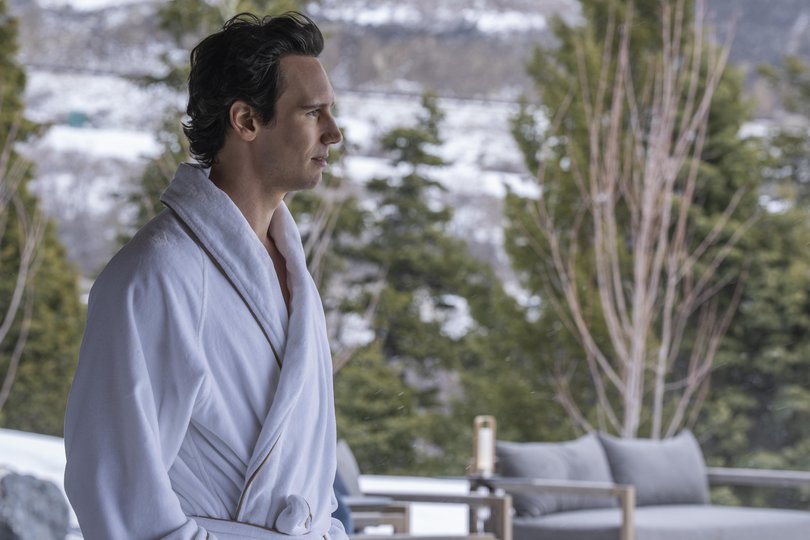Mountainhead: Jesse Armstrong’s satire is not a comedy but a horror movie
The creator of Succession has taken his blow torch to the new villain class: tech billionaires. But the joke is on us.

There is something beautifully comforting about satires.
At their best, satires are cutting and incisive, and it gives form to truths we have all suspected but couldn’t articulate with the same eloquence or wit. They’re also damn funny.
How many times have you properly cackled out-loud watching Veep, marvelling at the ineptitude on display as Selina Myers and her staff hit panic stations over every little thing? Or found joy when Peter Sellers yelled out there’s no fighting in the war room in Dr Strangelove?
Sign up to The Nightly's newsletters.
Get the first look at the digital newspaper, curated daily stories and breaking headlines delivered to your inbox.
By continuing you agree to our Terms and Privacy Policy.Almost every scene in Succession is a masterclass in capturing the injustice and tragedy of the uber-rich Roys who have everything except love and peace.
Jesse Armstrong created Succession and he wrote on Veep (and its predecessor The Thick of It), so he knows a thing or two about skewering the powerful. His Succession follow-up, Mountainhead, which he wrote and directed, takes a blow-torch to the new villain class: tech billionaires.
The conceit is relatively simple: four super wealthy friends – Randall (Steve Carell), Venis (Cory Michael Smith), Hugo (Jason Schwartzman) and Jeff (Ramy Youssef) – converge at Hugo’s newly built mountaintop chalet for a weekend of poker and dick-measuring.

While ensconced in the lap of luxury, the world is burning, literally. Venis, a Mark Zuckerbergian stand-in, owns global social media network which has just released a dangerously irresponsible AI patch that has fuelled disinformation with fake videos that have inflamed crime.
Countries and economies are toppling - the Mayor of Paris has been assassinated, while hundreds of people were burnt alive in a community centre in India after they were falsely identified as preparing to desecrate religious sites.
Venis is not moved by this, only frustrated that those “users” in those “markets” aren’t sophisticated enough to distinguish the real from the fake. When they do, it’ll all be grand because “funny content” such as an AI video of Snoopy with a hard-on will solve the Israeli-Palestine conflict.
Amid the comparisons to the Catiline Conspiracy or Arab Spring (because that worked out so well), three of the four tech barons stand over a Risk board game, literally carving out the world as their own fiefdoms. Would Randall, a Marc Andreesen-esque venture capitalist, prefer remaking the global south or deal with the credit crunch in the north.
At one point, Hugo is designated as the guy who should go and take over a now-shambolic Argentina (“I don’t know if I want to run Argentina on my own”, he opines while Randall wonders if he’s already sold his house there or not).

Never mind that Hugo couldn’t even run a coffee chain, because “running Paraguay is easier than launching into a mature market”.
Hugo, by the way, has the nickname of Soup. It sounds like “supe” at first, like a superhero, but it actually stands for “soup kitchen” because his net worth is a measly $521 million, compared to Venis’ $220 billion, Randall’s $63 billion and Jeff’s $59 billion, although that order will change and disrupt what existing dynamic there was between the men.
Throwing out pretentious references to Marcus Aurelius, Emmanuel Kant, and the superman mythmaker himself, Friedrich Nietzsche, they sincerely believe they would do a better job running the world than elected governments and the will of the people, just because Randall has an IQ of 200 and Venis can roll out utilitarianism but without the depth of, say, The Good Place.
Venis even says the quiet part out-loud, which is that eight billion people in the world, you can’t trust them, so, you know, why not “coup out the US”. Yes, coup, as in coup d’état, comparing themselves to the Bolsheviks. It will be an “upgrade” on the whole world, as if humanity can be improved with a software patch.
If you think the worst corporate jargon (“let’s blue sky this”) is insufferable, mix that with the high-falutin pretensions of first-year philosophy students and classics majors and you have the delulu mind of a tech bro.
It’s the intellectualising and dehumanisation through the lens of Nietzschean superiority, Ayn Rand’s hyper-libertarianism, and barely coded white supremacy that makes Mountainhead not so much a comedy as a horror movie.
People are not people, they’re only engagement numbers.

Satire is usually funny, but Mountainhead rarely elicits a laugh-out-loud moment. Not because it’s not eviscerating and sharp, because it is. But because it’s so anxiety-inducing that it feels like some Ken Loach-ian social realism rather than an Armando Iannucci or Jesse Armstrong satire.
There’s not a single exchange, line of dialogue or sentiment expressed that seems exaggerated or rings false – and that makes Mountainhead really terrifying. It’s hard to laugh and chuckle when you’re genuinely afraid, not of the scenes on the screen but of the men, because it’s almost always men, calling the shots in Silicon Valley.
We don’t need to have hung out intimately and extensively with tech moguls to identify the egos and values in the room. We have all seen, heard or read enough verified accounts of how these founder, VC and baron mentalities work to know that these are likely exactly the conversations and petty retaliations going on.
That the power amassed by these people and these platforms are greater than that should be concentrated, and that their amorality is scarier than immorality. It’s much harder to counter amorality.

In Succession, Armstrong humanised his characters so that, in the end, you can still empathise with the Roys, no matter how monstrous they can be.
Mountainhead doesn’t allow that grace, at least no more than a smidge although Randall has a subplot that contextualises some of his actions, and Jeff is, at times, sympathetic as the voice of scepticism calling out Venis’s platform.
But these characters are far more villainous than the Roys, or the folks in Veep, The Thick of It or Dr Strangelove. Perhaps that’s an acknowledgement that today’s tech bros are, ultimately, far more dangerous than the media barons or those in government. Worst of all, they really believe their own BS.
There is no comfort to be found here.
Rating: 3.5/5
The Mountainhead is streaming on Max on June 1

